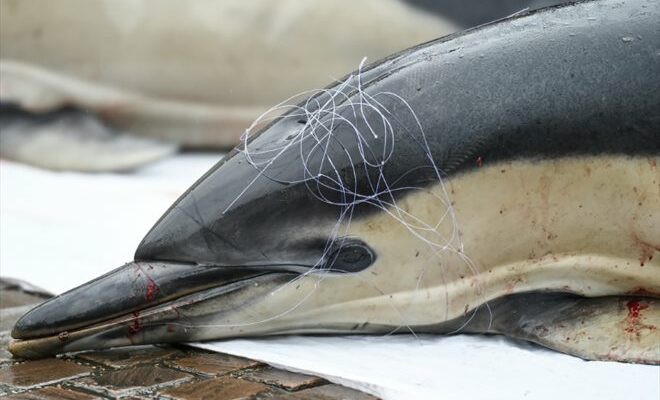The head of a dead dolphin exposed during a demonstration to denounce non-selective fishing, in Nantes on February 24, 2023 (AFP/Archives/Sebastien SALOM-GOMIS)
To preserve the dolphins, French and foreign fishermen from the Bay of Biscay will be confined to the port for a month from Monday, a first since 1945, to the great dismay of an industry which fears “social breakdown” despite compensation.
The French government formalized on Thursday the extension to all flags of the measure, ordered at the end of December by the Council of State, while promising to support all players in the sector.
An unprecedented situation since the Second World War, fishing will be almost entirely interrupted until February 20 from Finistère to the Spanish border.
This “spatio-temporal closure”, presented as “historic” by environmental associations, aims to reduce the deaths of small cetaceans accidentally caught in nets.
Ciem, the international scientific reference body, estimates that around 9,000 common dolphins die each year from accidental capture on the French Atlantic coast, for a sustainable level of 4,900 deaths at most.
The cessation of fishing for boats over eight meters and for certain types of fishing, also valid in 2025 and 2026, leaves 450 French vessels at the dock.
The National Fisheries Committee (CNPMEM) castigated “extremist NGOs” defending a species, the common dolphin, “not in danger in the sector” according to it.
“It’s absurd to stop businesses like that for a month,” Raymond Millet, a fisherman in La Rochelle, told AFP.
“Nine, ten, eleven meter boats are not boats that fish for dolphins, we have to stop… I’ve been fishing for forty years, I catch dolphins every time I lose a molar!” , quips the sixty-year-old, boss of a filleter affected by the ban.
– “Relentlessly” –
In a circular addressed to Breton shipowners and consulted by AFP, the administration mentions compensation of around 80% of the turnover of fishing companies. That’s a slate worth several tens of millions of euros.
“There will be social disruption,” fears Franck Lalande, owner of two boats in Arcachon (Gironde). Vice-president of the Regional Fisheries Committee of Nouvelle-Aquitaine, he deplores insufficient compensation, therefore “unacceptable”.
Payment deadlines also worry fishermen.
Julien Lamothe, director of the FROM Sud-Ouest producers’ organization, criticizes a “relentlessness on the sector” with this “new constraint which impacts companies, some of which have complicated cash flow”.
And the entire industry is worried: in La Rochelle, criers and fishmongers were bustling around boxes of shrimp, gurnard and sea bream early Thursday morning for this final week of activity.
Pascal Bouillaud, director of the joint union of the fishing port of La Rochelle, mentions “55% of the tonnage and turnover lost at the auctions concerned over the period concerned because these are extremely buoyant months”.
During the closure, wholesalers will have to find fish caught elsewhere, with the risk of seeing their buyers obtain supplies differently and probable inflation for the end consumer.
– Patrols –
The fish merchants, who process the fresh fish landed in the auctions, estimate their losses at more than 60 million euros.
“Some fishmongers are weakened and risk not making it,” warns Guillaume Badoinot, president of the Charentais fishmongers’ union.
In response, the government promised Thursday to support “the entire downstream and marketing sector, with the activation, if necessary, of partial unemployment measures and specific aid”.
Despite the threat of prosecution, some fishermen have suggested that they could go out to sea, but the Maritime Prefecture of the Atlantic promises patrols “a little more present than usual”.
“If the fishermen do not play the game, it is counterproductive for them” because “we will then see the mortality” of the dolphins, argues Philippe Garcia, president of Defense of Aquatic Environments (DMA), one of the associations having won his case before the Council of State.
Fishermen, for their part, believe they are stigmatized even though many have equipped their vessels with scarers or surveillance cameras, initially synonymous with exemptions.
“Today we have no proof of the effectiveness of stopping” fishing, judges Gaël Gueffier, boss of a gillnetter in Bayonne (Pyrénées-Atlantiques). “All we are asking is a solution so that there are no more accidental captures of cetaceans and so that we can continue to work normally.”
© 2024 AFP
Did you like this article ? Share it with your friends using the buttons below.




